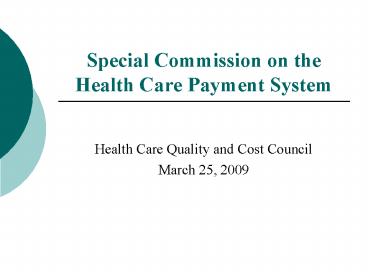Special Commission on the Health Care Payment System - PowerPoint PPT Presentation
1 / 8
Title:
Special Commission on the Health Care Payment System
Description:
Payment Models Referenced in Statute. Episodes-of-care payments. Blended capitation rates ... 21st Floor, Rooms 1 and 2. McCormack Building. One Ashburton Place ... – PowerPoint PPT presentation
Number of Views:40
Avg rating:3.0/5.0
Title: Special Commission on the Health Care Payment System
1
Special Commission on the Health Care Payment
System
- Health Care Quality and Cost Council
- March 25, 2009
2
Overview
- The Special Commission on the Health Care Payment
System was created under Section 44 of Chapter
305 of the Acts of 2008. - Goal Investigate reforming and restructuring
the payment system to provide incentives for
efficient and effective patient-centered care and
to reduce variations in the quality and cost of
care.
3
Membership of Commission
- Ten-member Commission consisting of
- Ex-Officio Members
- Leslie Kirwan, Secretary, Executive Office for
Administration and Finance (co-chair) - Sarah Iselin, Commissioner, Division of Health
Care Finance and Policy (co-chair) - Dolores Mitchell, Executive Director, Group
Insurance Commission - Legislative Appointments
- Senator Richard T. Moore (appointed by the Senate
President) - Representative Harriett Stanley (appointed by the
Speaker of the House) - Gubernatorial Appointments
- Deborah C. Enos, President and CEO, Neighborhood
Health Plan, Inc. - Representing the Massachusetts Association of
Health Plans, Inc. - Andrew Dreyfus, Executive Vice President, Health
Care Services - Representing Blue Cross and Blue Shield of
Massachusetts, Inc. - Lynn Nicholas, President and CEO
- Representing the Massachusetts Hospital
Association, Inc. - Dr. Alice Coombs, Vice President
- Representing the Massachusetts Medical Society
4
Responsibilities
- Examine payment methodologies and purchasing
strategies, including, but not limited to
alternatives to fee-for-service models - Recommend a common transparent payment
methodology and - Recommend a plan for the implementation of the
common payment methodology across all public and
private payers in the Commonwealth, including a
plan for MA to seek a waiver from federal
Medicare rules to facilitate implementation.
5
Payment Models Referenced in Statute
- Episodes-of-care payments
- Blended capitation rates
- Global budgets
- Pay-for-performance programs
- Medical home models
- Tiering of providers
- Evidence-based purchasing strategies
6
Draft Principles for Health Care Payment Reform
Vision The Commission seeks to develop
recommendations for fundamental reform of the
Massachusetts health care payment system that
will support safe, timely, efficient, effective,
equitable, patient-centered care and
significantly and sustainably slow the high rate
of health care cost growth.
- As currently implemented, fee-for-service payment
rewards service volume rather than outcomes and
efficiency, and therefore other models should be
considered. - At a minimum, payments should be adequate to
cover the costs of efficient providers, support
investments in system infrastructure, and ensure
timely access to high quality, patient-centered
care. - Provider payment systems should reward and
promote the delivery of efficient, coordinated,
patient-centered, high quality health care that
aligns with evidence-based guidelines, where
available, and produces superior outcomes and
improved health status. Performance measurement
should rely upon reliable information and utilize
uniform, nationally accepted quality measures. - Provider payment systems should balance payments
for cognitive, preventive, behavioral, chronic
and interventional care, support the development
and maintenance of an adequate supply of primary
care practitioners and respond to the
cross-subsidization occurring within provider
organizations as a result of the current lack of
balance in payment levels by service.
7
Draft Principles (continued)
- Health care payments should be uniform on a
risk-adjusted and socio-economic-adjusted basis
wherever technically possible, and regardless of
payer and provider, to the extent that this is
financially feasible. - If not financially feasible, then differences
should be transparent. - Payments above the uniform rate should be based
on performance. - Costs associated with desired investments in
teaching, research and desired special stand by
capacity should be paid outside of the uniform
rate, and should require provider accountability
for how such payments are spent. - The health care payment system should be
organized in such a way as to minimize provider,
payer and patient administrative costs that do
not add value. - Payment reform must consider how a) some payment
methods may require certain organization of the
service delivery system, and b) health benefit
designs either support or limit payment reform. - Health care cost growth should be reduced, and
providers, payers, private and public purchasers
and patients should all share in the savings
arising from payment reform. - The health care payment system should be
transparent to patients, providers and
purchasers. - It will be necessary to consider the diversity of
populations, geography and providers across the
Commonwealth when designing payment reform to
ensure high quality, patient-centered care to all
populations and geographic regions in the
Commonwealth. - Implementation should be phased over time with a)
clear and attainable deadlines, b) planned
evaluation for intended and unintended
consequences and c) mid-course corrections.
8
Meeting Schedule































